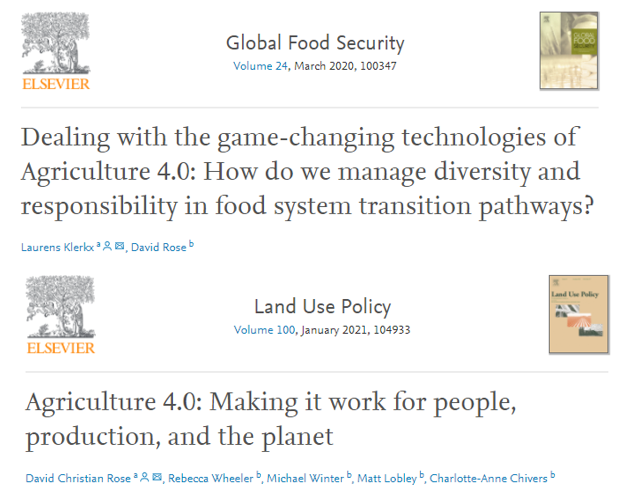#FoodSystems transformation is getting quite some attention lately in view of the 2021 UN @FoodSystems Summit. But what does this imply for research and innovation systems? What roles for innovation/transition studies? A thread (not pretending to be complete).
Early work was done by @IPESfood on lock-ins hindering food systems transformation from industrial food systems towards agroecology ( http://www.ipes-food.org/reports/# ),">https://www.ipes-food.org/reports/... and follow-up studies on for example power concentration and consolidation in agri-food and agroecology transition cases.
Since 2017, @foresight4food chaired by @timgbenton and Patrick Caron @cirad aims to be & #39;a mechanism for better analysis and synthesis of key trends and possible futures in global food systems and to support more informed and strategic dialogue& #39;, aggregating foresight work.
High level policy reports have been published lately alluding to the topic of transition and transformation, e.g work led by @JennClapp for the High Level Panel of Experts of the Committee on World Food Security of FAO ( http://www.fao.org/3/ca9731en/ca9731en.pdf">https://www.fao.org/3/ca9731e... - see recommendation 12).
@CGIARclimate has the & #39;Transforming Food Systems Under a Changing Climate& #39; initiative ( https://www.transformingfoodsystems.com/ )">https://www.transformingfoodsystems.com/">... commissioning studies on diverse adaptation pathways, policy change, future technologies and finance by scholars such as @LindsayStringer, @jessfanzo, @JMockshell
@WLE_CGIAR supports the Commission on
Sustainable Agriculture Intensification https://wle.cgiar.org/cosai/ ">https://wle.cgiar.org/cosai/&qu... with a & #39;Big Question& #39; on & #39;Changing innovation systems at scale: What does it take [...] to get particular innovation investors, organizations and systems to promote SAI?
Sustainable Agriculture Intensification https://wle.cgiar.org/cosai/ ">https://wle.cgiar.org/cosai/&qu... with a & #39;Big Question& #39; on & #39;Changing innovation systems at scale: What does it take [...] to get particular innovation investors, organizations and systems to promote SAI?
Noteworthy is also the work of @EATforum, The Global Science-Based Platform for Food System Transformation, well known for the Commission Food in The Anthropocene https://eatforum.org/ ,">https://eatforum.org/">... combining science, engagement and action.
@AtkinsonCenter an Expert Panel & #39;Innovations to Build Sustainable, Equitable, Inclusive Food Value Chains& #39; co-chaired by scholars such as @cbb2cornell, @jessfanzo, @timgbenton, synthesizing evidence and identifying gaps https://doi.org/10.1038/s41893-020-0471-3">https://doi.org/10.1038/s...
Also in journals like @NatureFoodJnl by scholars like @jessfanzo, @OosterveerPeter, @Vervoort_Joost, @AniekHebinck, @amloboguerrero, @Feeding9Billion ( https://doi.org/10.1038/s43016-020-0136-4,">https://doi.org/10.1038/s... https://doi.org/10.1038/s43016-020-0074-1,">https://doi.org/10.1038/s... https://doi.org/10.5751/ES-10054-230216,">https://doi.org/10.5751/E... https://doi.org/10.1016/j.gfs.2020.100432,">https://doi.org/10.1016/j... https://doi.org/10.1016/j.oneear.2019.10.022).">https://doi.org/10.1016/j...
These initiatives, reports and articles emphasize that food system transformation requires a holistic multi-level, multi food systems component approach, combined social, economic, institutional and policy innovation, with attention to issues such as justice, power, inclusion.
Research & innovation systems need to be fit for purpose, but reflection on this remains often implicit in many initiatives, articles and reports. Though certainly not absent/unused, innovation and transition studies have lots to offer, and can be used more than currently done.
A few questions can be asked:
 https://abs.twimg.com/emoji/v2/... draggable="false" alt="▶️" title="Nach rechts zeigendes Dreieck" aria-label="Emoji: Nach rechts zeigendes Dreieck">1) How to shape research systems for food systems transformation?
https://abs.twimg.com/emoji/v2/... draggable="false" alt="▶️" title="Nach rechts zeigendes Dreieck" aria-label="Emoji: Nach rechts zeigendes Dreieck">1) How to shape research systems for food systems transformation?
 https://abs.twimg.com/emoji/v2/... draggable="false" alt="▶️" title="Nach rechts zeigendes Dreieck" aria-label="Emoji: Nach rechts zeigendes Dreieck">2) What is the role for innovation systems more broadly?
https://abs.twimg.com/emoji/v2/... draggable="false" alt="▶️" title="Nach rechts zeigendes Dreieck" aria-label="Emoji: Nach rechts zeigendes Dreieck">2) What is the role for innovation systems more broadly?
 https://abs.twimg.com/emoji/v2/... draggable="false" alt="▶️" title="Nach rechts zeigendes Dreieck" aria-label="Emoji: Nach rechts zeigendes Dreieck"> 3) How to manage diverse transition pathways responsibly and inclusively?
https://abs.twimg.com/emoji/v2/... draggable="false" alt="▶️" title="Nach rechts zeigendes Dreieck" aria-label="Emoji: Nach rechts zeigendes Dreieck"> 3) How to manage diverse transition pathways responsibly and inclusively?
These are relevant for many ongoing efforts.
These are relevant for many ongoing efforts.
For 1), work by @csiro, @IFazey et al, @Kristiaankok7 and @ACLdenBoer et al. indicates this also requires a transformation of research systems (e.g. paradigms, methods, funding) ( https://doi.org/10.1016/j.erss.2020.101724,">https://doi.org/10.1016/j... https://doi.org/10.3390/su11247176,">https://doi.org/10.3390/s... https://doi.org/10.1016/j.tifs.2020.09.021,">https://doi.org/10.1016/j... https://cas.cgiar.org/isdc/publications/public-agricultural-research-era-transformation-challenge-agri-food-system).">https://cas.cgiar.org/isdc/publ...
For 2), as @lauklerkx, Begemann and @melissaleach et al. argue, understanding directionality, distribution, diversity, democracy and how they shape & #39;missions& #39; in innovation systems towards a variety of future food systems is key ( https://doi.org/10.1016/j.agsy.2020.102901,">https://doi.org/10.1016/j... https://doi.org/10.1016/j.worlddev.2020.105024).">https://doi.org/10.1016/j...
For 3) frameworks of Responsible Research and Innovation and justice can help guide innovation for transformation, as @d_christianrose, @lauklerkx, @c_timmermann et al. have argued ( https://doi.org/10.1016/j.landusepol.2020.104933,">https://doi.org/10.1016/j... https://doi.org/10.1016/j.gfs.2019.100347,">https://doi.org/10.1016/j... https://core.ac.uk/download/pdf/186331093.pdf).">https://core.ac.uk/download/...
Such reflections are important, as in the past agricultural research and innovation systems have not always been inclusive of a diversity of farmers and actors as @eco_marci and @mollenburger argue https://issues.org/how-to-improve-the-social-benefits-of-agricultural-research/">https://issues.org/how-to-im...
There is a large experience in agri-food innovation studies, e.g groups such as @cpt_wur, @PagePisa and @CCRI_UK in the science of transition studies and scaling ( @marc_schut et al.), drawing on different transition models ( https://doi.org/10.1016/j.jclepro.2019.02.232,">https://doi.org/10.1016/j... https://doi.org/10.1016/j.agsy.2020.102908).">https://doi.org/10.1016/j...
Though much can be gained from stronger engament with core groups in transition/transformation, e.g. @LevPoints4Sust, @drifteur, @UUCopernicus, @sthlmresilience, @SPRU. Beyond energy and mobility systems, they are increasingly working on food systems as @ist2020_vienna showed.
This experience can help in a) more systematically understand and guide food system transition pathways, b) provide key insights on how to shape research and innovation systems for food systems transformation, c) provide insights on how to & #39;phase-out& #39; unsustainable food systems.
Thus stronger mutual engagement of transition studies ( @STRN_Network) and food systems transformation initiatives (the above, but also @thoughtforfood_, @FoodDialogues, @futureoffoodorg, @oxfutureoffood, @SLUFutureFood, @ethzWFSC, @ArrellFoodInst) can enrich science and practice!

 Read on Twitter
Read on Twitter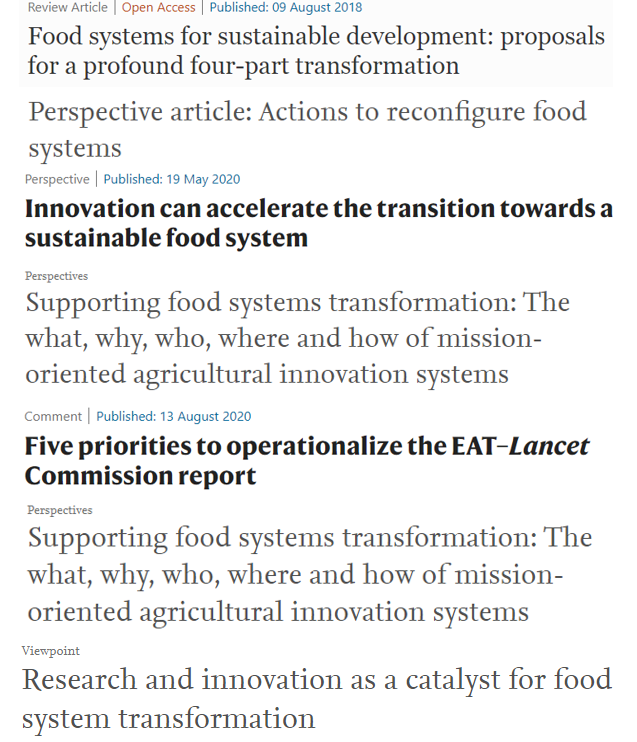
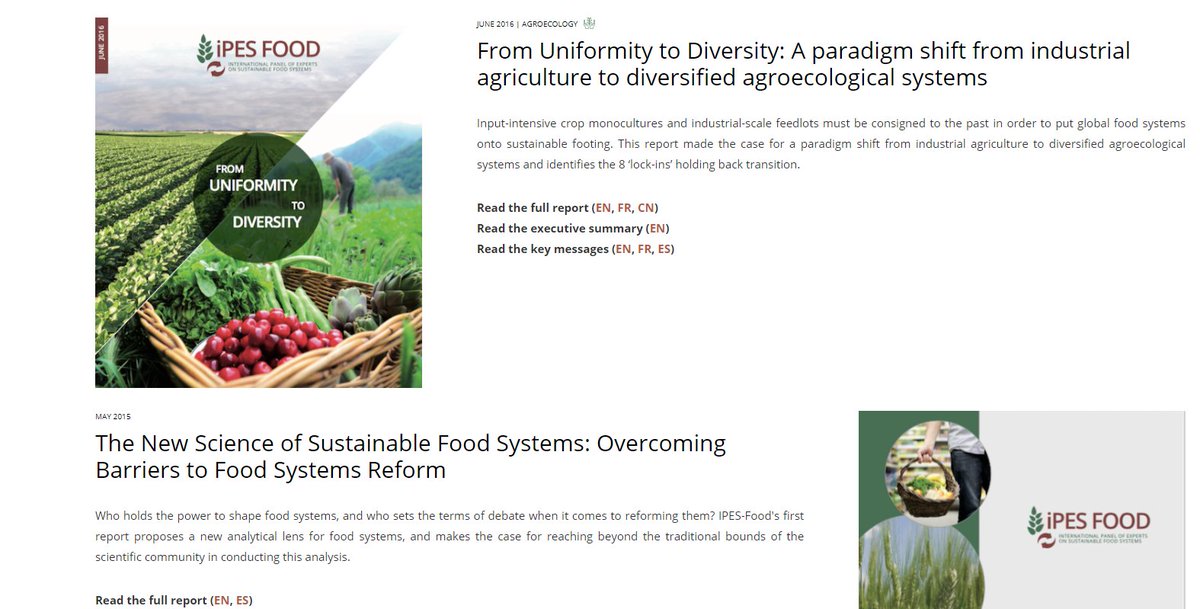
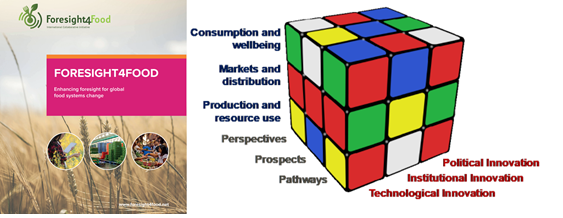
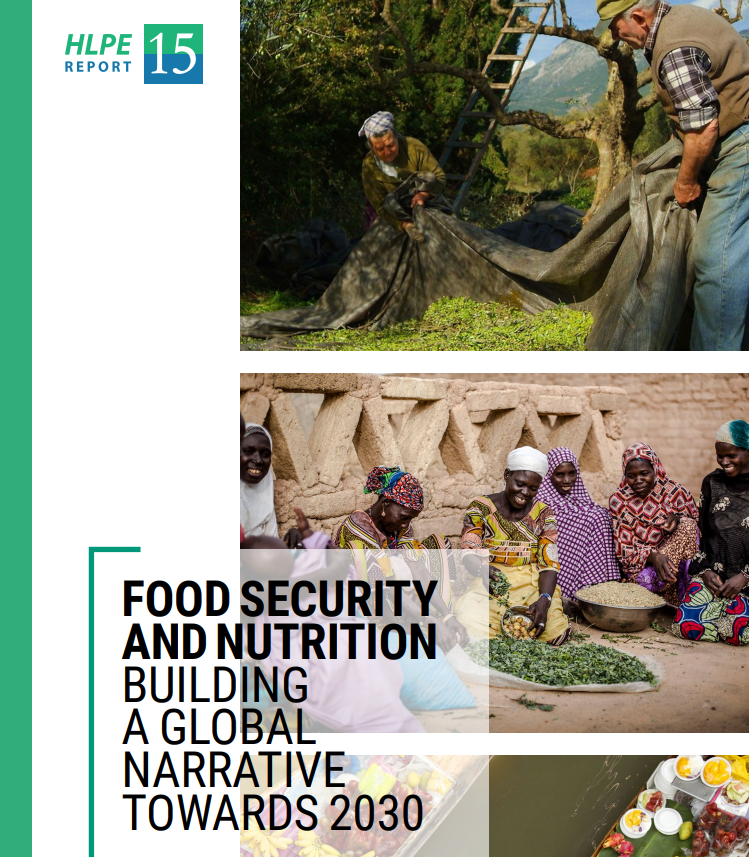
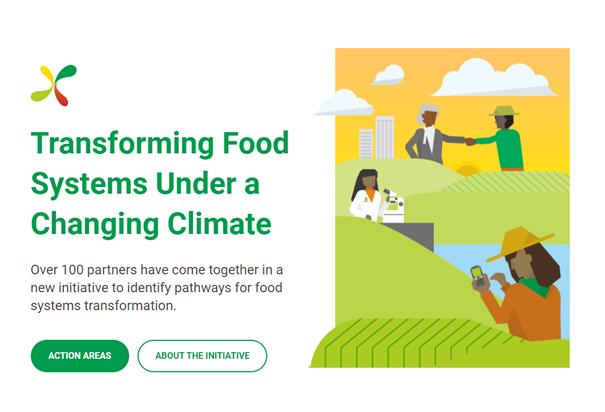
![@WLE_CGIAR supports the Commission onSustainable Agriculture Intensification https://wle.cgiar.org/cosai/&qu... with a & #39;Big Question& #39; on & #39;Changing innovation systems at scale: What does it take [...] to get particular innovation investors, organizations and systems to promote SAI? @WLE_CGIAR supports the Commission onSustainable Agriculture Intensification https://wle.cgiar.org/cosai/&qu... with a & #39;Big Question& #39; on & #39;Changing innovation systems at scale: What does it take [...] to get particular innovation investors, organizations and systems to promote SAI?](https://pbs.twimg.com/media/EjluNClWoAE6F6g.jpg)

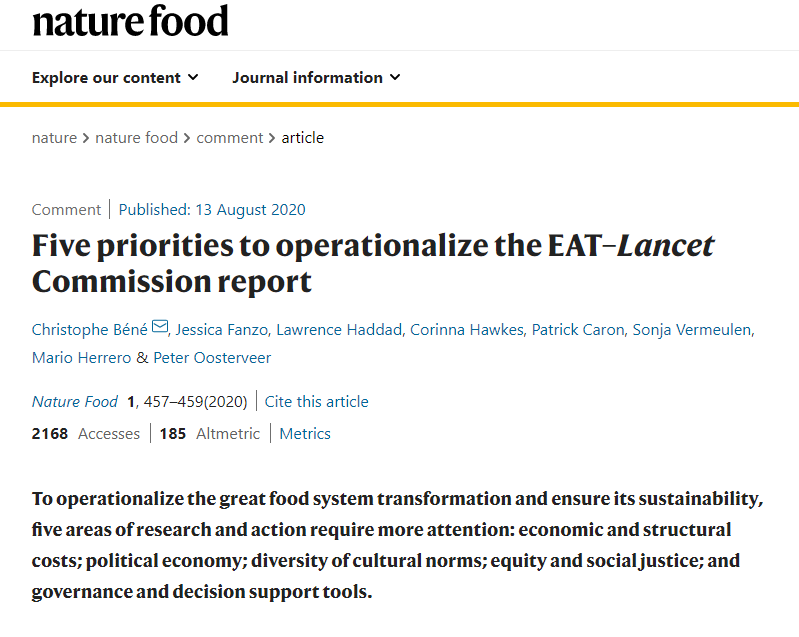

 1) How to shape research systems for food systems transformation?https://abs.twimg.com/emoji/v2/... draggable="false" alt="▶️" title="Nach rechts zeigendes Dreieck" aria-label="Emoji: Nach rechts zeigendes Dreieck">2) What is the role for innovation systems more broadly?https://abs.twimg.com/emoji/v2/... draggable="false" alt="▶️" title="Nach rechts zeigendes Dreieck" aria-label="Emoji: Nach rechts zeigendes Dreieck"> 3) How to manage diverse transition pathways responsibly and inclusively?These are relevant for many ongoing efforts." title="A few questions can be asked:https://abs.twimg.com/emoji/v2/... draggable="false" alt="▶️" title="Nach rechts zeigendes Dreieck" aria-label="Emoji: Nach rechts zeigendes Dreieck">1) How to shape research systems for food systems transformation?https://abs.twimg.com/emoji/v2/... draggable="false" alt="▶️" title="Nach rechts zeigendes Dreieck" aria-label="Emoji: Nach rechts zeigendes Dreieck">2) What is the role for innovation systems more broadly?https://abs.twimg.com/emoji/v2/... draggable="false" alt="▶️" title="Nach rechts zeigendes Dreieck" aria-label="Emoji: Nach rechts zeigendes Dreieck"> 3) How to manage diverse transition pathways responsibly and inclusively?These are relevant for many ongoing efforts." class="img-responsive" style="max-width:100%;"/>
1) How to shape research systems for food systems transformation?https://abs.twimg.com/emoji/v2/... draggable="false" alt="▶️" title="Nach rechts zeigendes Dreieck" aria-label="Emoji: Nach rechts zeigendes Dreieck">2) What is the role for innovation systems more broadly?https://abs.twimg.com/emoji/v2/... draggable="false" alt="▶️" title="Nach rechts zeigendes Dreieck" aria-label="Emoji: Nach rechts zeigendes Dreieck"> 3) How to manage diverse transition pathways responsibly and inclusively?These are relevant for many ongoing efforts." title="A few questions can be asked:https://abs.twimg.com/emoji/v2/... draggable="false" alt="▶️" title="Nach rechts zeigendes Dreieck" aria-label="Emoji: Nach rechts zeigendes Dreieck">1) How to shape research systems for food systems transformation?https://abs.twimg.com/emoji/v2/... draggable="false" alt="▶️" title="Nach rechts zeigendes Dreieck" aria-label="Emoji: Nach rechts zeigendes Dreieck">2) What is the role for innovation systems more broadly?https://abs.twimg.com/emoji/v2/... draggable="false" alt="▶️" title="Nach rechts zeigendes Dreieck" aria-label="Emoji: Nach rechts zeigendes Dreieck"> 3) How to manage diverse transition pathways responsibly and inclusively?These are relevant for many ongoing efforts." class="img-responsive" style="max-width:100%;"/>

